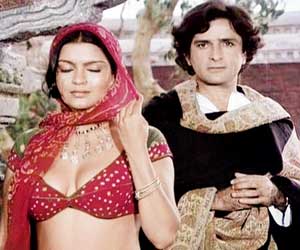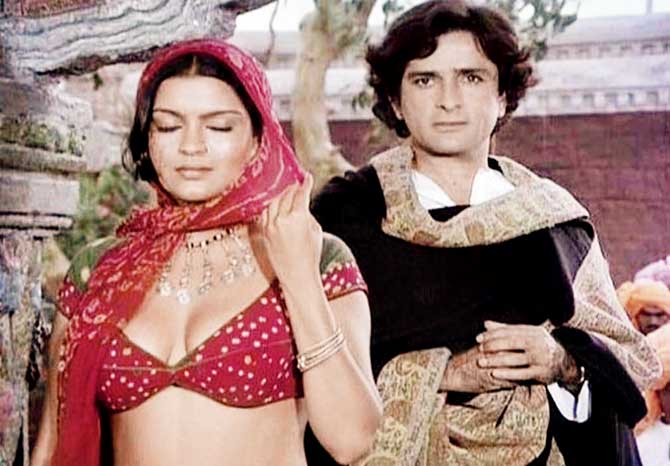Here's to Shashi Kapoor, whose films helped millions of teenagers address the adolescent's inner life and unlock their sexual minds

 Shashi Kapoor's 1973 film Aa Gale Lag Jaa baffled the nine-year-old me. In it, Sharmila Tagore and Shashi Kapoor's characters visit Shimla and she catches cold and is in danger of hypothermia, so he uses his body heat that night to save her life. Surprisingly, nine months later she gave birth. How could that happen, I asked a teenaged cousin who was a girl, which meant she knew. She matter-of-factly told me that when a man and woman slept together, it made a baby. What nonsense, I said. I've slept next to cousins and aunts, none of them made a baby. (It now occurs to me that only those who did not sleep next to me got pregnant.) "No," she insisted, "that's how it happens." She mumbled something about clothes, but I dismissed that as linked to the Shimla snow and hypothermia, etc.
Shashi Kapoor's 1973 film Aa Gale Lag Jaa baffled the nine-year-old me. In it, Sharmila Tagore and Shashi Kapoor's characters visit Shimla and she catches cold and is in danger of hypothermia, so he uses his body heat that night to save her life. Surprisingly, nine months later she gave birth. How could that happen, I asked a teenaged cousin who was a girl, which meant she knew. She matter-of-factly told me that when a man and woman slept together, it made a baby. What nonsense, I said. I've slept next to cousins and aunts, none of them made a baby. (It now occurs to me that only those who did not sleep next to me got pregnant.) "No," she insisted, "that's how it happens." She mumbled something about clothes, but I dismissed that as linked to the Shimla snow and hypothermia, etc.
ADVERTISEMENT

Shashi Kapoor continued to tutor me in sexuality in Satyam Shivam Sundaram
In 1978, my father reluctantly took me to a New York cinema to watch Shashi Kapoor in Raj Kapoor's 1978 film, Satyam Shivam Sundaram. My father's friend "Dr Gupta dentist" said it was a dirty movie; my father scolded him for talking like a villager. It starred Zeenat Aman as one of the healthiest village belles who ever existed. Severe burns have scarred her face, so she hides it behind the hem of her excuse-of-a-sari. Shashi Kapoor goes crazy for her; he was obviously not looking at her face. Come to think of it, the camera kept my 14-year-old eyes away from her face as well. Shashi Kapoor continued tutoring me in human sexuality as I realised what happened in Aa Gale Lag Jaa. Still, I felt indignant when Shashi Kapoor's character marries Zeenat's, sees her face and rejects her as an imposter. What a test of our credulity.
I, sitting in a theatre, knew that her fabulous body was attached to her scarred face; but the hero, despite being right there in real life, did not. Could a man go blind with lust? Shashi Kapoor winked from the screen. Easily, he said. I returned to India, and one night in 1987, I watched a late show of an art movie playing nearby. Shashi Kapoor not only produced Utsav, but also had a leading role. The film was adapted from a Sanskrit play that I knew as the Amar Chitra Katha comic, Vasantsena. Girish Karnad directed it as a bawdy film with a light touch; the memorable scene has the lead, Shekhar Suman, finding Vasantsena (played by the voluptuous Rekha) completely decked in gold jewellery and thus unable to undress her. She points him to a gold pin that he pulls out, only to find all the gold sliding off her body and rendering her naked.
Shashi Kapoor plays the corpulent bigwig Sansthanak who is besotted by Vasantsena; she incessantly spurns him due to his grotesque looks and vulgar behaviour. Shashi Kapoor was a far cry from the usual chocolate-faced, second-fiddle, good guy that moviegoers were accustomed to. It was a shock to see the same fella who uttered the immemorial line "Mere paas maa hain" (in Deewar), to display himself panting and drooling over the unattainable prostitute. A young man like me always knew to commiserate with a man driven by unrequited lust to despair and drink.
I then watched Stephen Frears' 1987 film Sammy and Rosie Get Laid, in which Shashi Kapoor played Sammy's dad, a government official visiting from India. I found the film boring and pretentious, but Shashi Kapoor stood out in the cast. His character meets an old girlfriend from when he was a student in London, played by Claire Bloom, and then the two of them engage in middle-aged sex (with the screen divided into three: Sammy and Rosie each having their own trysts in the other panes). To watch Shashi Kapoor bare his buttocks and go at it with an English lady earned the man my respect, yet again.
The last time I saw Shashi Kapoor in a film was when he played a newspaper editor in New Delhi Times. The film is a deception operation in which a canny politician stages an attack upon himself so that the editor is manipulated into crusading against the politician's rival. A lot of people I knew, including fellow journalists, were deeply impressed by the plot. I, however, was incredulous that anyone could imagine an editor to fall for such a plain, obvious and ludicrous set-up. I decided that Shashi Kapoor was better sticking to addressing the adolescent male's inner life and unlocking his sexual mind; his delving into the adult male's public life by uncovering the wheels-within-wheels that characterise society was less than convincing. Nonetheless, these (and his more famous) movies made for a memorable journey. Shashi Kapoor's passing last Monday night was an end to a remarkable life as art, as film.
Aditya Sinha's crime novel, The CEO Who Lost His Head, is available now. He tweets @autumnshade Send your feedback to mailbag@mid-day.com
Catch up on all the latest Mumbai, National and International news here
Download the new mid-day Android and iOS apps to get updates on all the latest and trending stories on the go
 Subscribe today by clicking the link and stay updated with the latest news!" Click here!
Subscribe today by clicking the link and stay updated with the latest news!" Click here!







